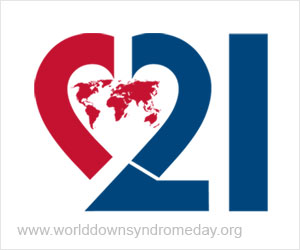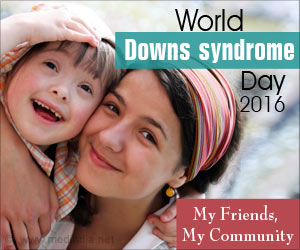- World Down Syndrome Day is marked on 21 March each year to celebrate children and adults with Downs and focus on specific issues
- This day is marked to consider various issues that affect the Down syndrome community and raise awareness on various aspects like inclusion, access and equal opportunity
- This year the theme in focus is “What I Bring to My Community” to raise the issue of inclusion and opportunities for all people with Down syndrome to work and contribute to society.
Theme for 2018
This year the theme for Down Syndrome Day is “What I Bring to My Community.” This is apt considering issues of exclusion and discrimination that the community faces. Children and adults with Down syndrome should be valued for whatever they can contribute. All societies must work towards inclusion and access for Down syndrome communities. Every individual must be able to access educational opportunities to develop skills and competencies. Young adults and adults with Down syndrome have shown how they can participate actively in society. There are people running their own bakeries and cafes who have paved the way forward. For example, Carolyn Sampson who runs a gluten-free bakery called Reason to Bake in North Carolina. Carolyn’s fresh gluten-free cookies which come in flavours like spicy ginger, chocolate chip and oatmeal raisin are sold in 13 retail outlets in North Carolina. People with Down syndrome need to be supported by society to find their interests and passions and live meaningful lives.- Jamie Brewer from the US starred in American Horror Story: Murder House and American Horror Story: Coven
- Chris Burke from the US played a role in Life Goes On
- Luke Zimmerman starred in The Secret Life of the American Teenager
- Paula Sage from Britain who won the BAFTA award for her role in After Life
- Madeline Stuart walked the ramp at New York Fashion Week in 2015.
What is Down Syndrome?
Down syndrome is a chromosomal disorder occurring when an individual has an extra copy of chromosome 21. The additional chromosome interferes with normal physical and mental development leading to characteristics associated with Down syndrome. Some of the features occurring in individuals with Down syndrome include:- short stature
- low muscle tone
- upward slant in the eyes
References:
- World Down Syndrome Day 21 March - (http://www.un.org/en/events/downsyndromeday/)
- World Down Syndrome Day - (https://worlddownsyndromeday.org/)
- WDSC 2018 - (https://ds-int.org/wdsc-2018)
- About Down's Syndrome : World Down Syndrome Day - (https://www.downs-syndrome.org.uk/about/campaigns/world-downs-syndrome-day/)
- Down Syndrome - (https://www.ndss.org/about-down-syndrome/down-syndrome/)
Source-Medindia










